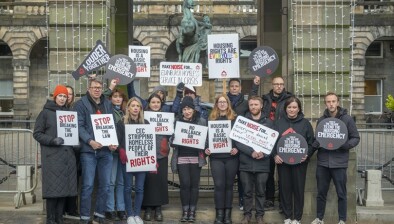Edinburgh poised to suspend lettings policy to prioritise homeless households

The City of Edinburgh Council is preparing to take the unprecedented step of suspending its general council house letting policy for up to a year, in a move aimed at tackling a mounting homelessness crisis and meeting legal obligations to provide suitable temporary accommodation.
The emergency measure, recommended in a report to councillors on Friday, would see all available council-owned housing stock redirected toward people experiencing homelessness.
If approved, only those with “gold priority” – typically individuals with acute medical needs or awaiting discharge from hospital – would be eligible for housing through the standard allocation process. All other vacant council homes would either be repurposed for temporary accommodation or allocated directly as permanent tenancies for homeless households.
This radical policy shift comes in response to a stark deterioration in Edinburgh’s housing emergency. Figures for March show that the council failed to accommodate 750 homeless households, representing nearly 58% of all presentations that month. Over the past year, these failures have more than doubled, with 3,263 instances recorded, a 115% increase from the previous year.
The shortage of legally compliant temporary accommodation was compounded by a legal ruling that forced the council to cease using hundreds of hotel and B&B placements that did not meet licensing requirements. The loss of these spaces has contributed to a rise in rough sleeping and further strained already stretched services.
By pausing routine lettings and focusing on bringing void council homes back into use, it is hoped the council could make 120 additional properties available each month for homeless households. There are currently around 700 voids citywide, with plans to reduce that number by half within the year. A similar, smaller-scale suspension in late 2023 led to 388 homes being returned to use.
While the proposal is seen as a necessary step to uphold legal obligations and reduce rough sleeping, officials acknowledged potential risks. They noted that easing access to permanent housing through homelessness services could inadvertently attract more people to the city seeking accommodation. However, this risk is considered modest.
Councillor Lezley Marion Cameron, convener for Housing, Homelessness and Fair Work, emphasised that the move reflects the council’s attempt to navigate an increasingly complex landscape with limited resources.
“The team is working as hard as they can in terms of what we’re able to do within resources that we have,” she said. “I’d like us to have far more resources.”
“Obviously as a council we don’t want to be flouting our legislative obligations. One of the things I am particularly encouraged about is that this time there’s no proposal to suspend the repairs as happened last time. There’s a huge element of non-preventable homelessness that comes Edinburgh’s way.
“We’re doing our best to mitigate. We’re acquiring homes, building, tackling voids, but there is a limit to what we can do with the resources available and that’s just the reality.”
The policy has been welcomed by Shelter Scotland, though the charity warned it must be followed by long-term planning.
Dan Fyffe-Jardine, Shelter Scotland’s assistant director of community and services, said: “This is finally an emergency action from the City of Edinburgh Council in response to years of law breaking and we remain ready to work with the council and other third sector partners in the city.
“It is the right thing to do in these circumstances after we raised our serious concerns last year over the council not showing the desire to tackle its own legal breaches. This is a tough lesson for all local authorities who are grappling with similar issues to learn. The earlier they take emergency action, the less painful it will be.
“However, this is not a long-term solution, and it cannot be the only action taken. We urgently need clarity on what the council’s next steps will be, and a clear, lawful pathway to ensuring everyone has a suitable home and their housing rights upheld.”







